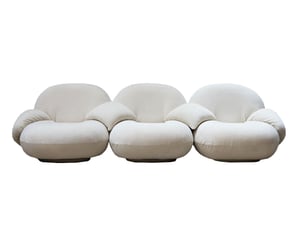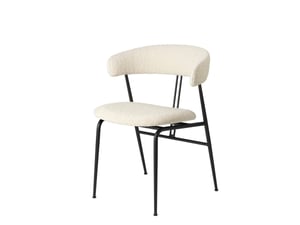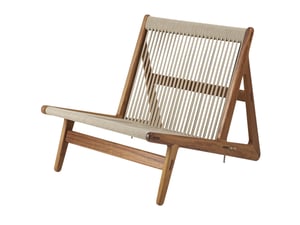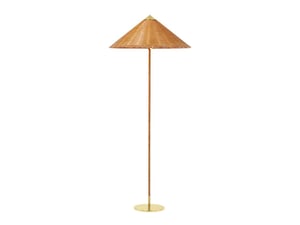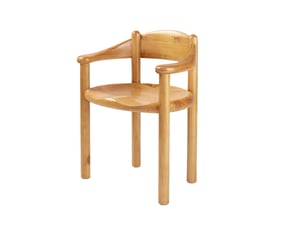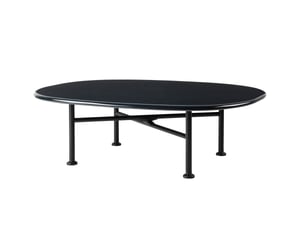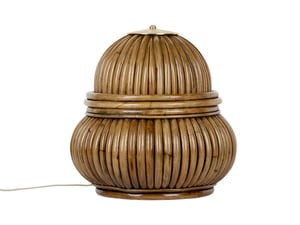Nordic minimalism meets zen balance: inside the Japandi aesthetic
At the heart of the Japandi aesthetic lies the quiet convergence of two worlds: the contemplative elegance of Japanese design and the functional minimalism of Scandinavian style. Born from the dialogue between Zen restraint and Nordic hygge, Japandi is more than a trend—it’s a way of living.

Clean lines, natural materials like wood and paper, light textiles, and a soft, muted color palette create spaces that radiate calm, warmth, and harmony. It’s an invitation to slow down and reconnect, where serenity and simplicity go hand in hand.

In the Japandi universe, every object tells a story. Pei-Ching Hsiao’s Taiwan-Lantern series exemplifies this narrative approach, combining traditional crafts such as ceramic work, botanical dyeing, painting, knotting, woodworking, metal welding, and bamboo weaving.
The Heritage Unicolors collection pays tribute to the Wu Xing philosophy, drawing on earth-inspired browns, metal-inspired whites, and water-evoking blacks to create a balanced composition rooted in ancient Asian aesthetics.




Lighting plays a pivotal role in shaping the Japandi atmosphere. Gubi’s floor and pendant lamps embrace this aesthetic with grace: from Paavo Tynell’s iconic 9602 floor lamp—nicknamed the “Chinese Hat”—crafted from woven rattan and softly diffused light, to the geometric simplicity of the Semi Pendant.

Each piece seamlessly merges Scandinavian minimalism with an Asian sensibility, shaping interiors that feel intimate and enveloping.


Gubi’s Pacha lounge chair is a natural complement—its generous, low-slung form speaks to a lifestyle grounded in ease and connection with the earth. Originally designed in the 1970s, its rounded silhouette and cocooning softness continue to express a timeless sense of wellbeing.
With the Knit lamp by Meike Harde for Vibia, light and texture converge in quiet harmony.
The knitted fabric becomes both tactile surface and luminous filter, casting a gentle, enveloping glow—ideal for quiet reading corners or cozy lounges, perfectly aligned with Japandi’s mood of inward reflection.
In Japanese, Akari means both “light” and “lightness”—a fitting name for Isamu Noguchi’s ethereal paper lanterns created for Vitra. Suspended like luminous sculptures, these rice paper creations are a poetic tribute to simplicity, evoking both the warmth of the sun and the stillness of Northern light.

The CH24 chair—known as the Wishbone—from Carl Hansen & Søn, finds new depth in the CH24P Exclusive Edition, dressed in luxurious Thor leather.




With its iconic Y-shaped back, the design becomes a symbolic bridge between Danish craftsmanship and the Japanese devotion to detail.



Ferm Living’s Rico sofa and ottoman reinterpret comfort with generous curves and a tactile bouclé texture. Their soft, informal presence embodies the Japandi spirit—gentle, quiet, and deeply welcoming.

Paired with the hand-woven rattan Dou floor lamp, the contrast between material tactility and oversized, geometric form creates a warm glow, filtering through the weave in fragments of soft, diffused light.
Poltrona Frau’s Kyoto table, designed by Gianfranco Frattini after a journey to Japan, celebrates the art of joinery. Its intersecting wooden slats recall traditional Japanese homes, where every joint is an intentional gesture, every detail a tribute to form and material.
&Tradition offers pieces that echo Japanese purity: archetypal forms, honest materials, and a quiet elegance.
Their seating and tables speak in a language of nature and purpose, creating meaningful interactions with the surrounding space.

Seto is a stool designed by Børge Mogensen for Fredericia. Crafted from solid oak with a canvas seat edged in leather cord, its H-shaped frame nods to the Seto Ōhashi Bridge—the longest in Japan.



This architectural reference lends the piece a graceful, contemporary silhouette that fits effortlessly into Japandi-style environments.

The Forma Room Divider by Anthony Guerrée is more than just a screen—it’s a sculptural gesture. With a folding structure in wood and metal, it subtly defines space while inviting moments of retreat. In Japandi interiors, where every area invites introspection, it becomes a flexible, elegant companion.
To embrace Japandi is to embrace slowness. Every chair, every light source, every object is a conscious choice—an expression of restraint, texture, and natural beauty. Stripped of the superfluous, rooted in the organic, this language of raw textures, tactile surfaces, and soft hues offers a gentler way of living. One that feels more human, more grounded, more true.
We turn your inspiration into a project
We help you shape your home, collecting the best inspirations for you and editing design selections that fit your space and needs.

